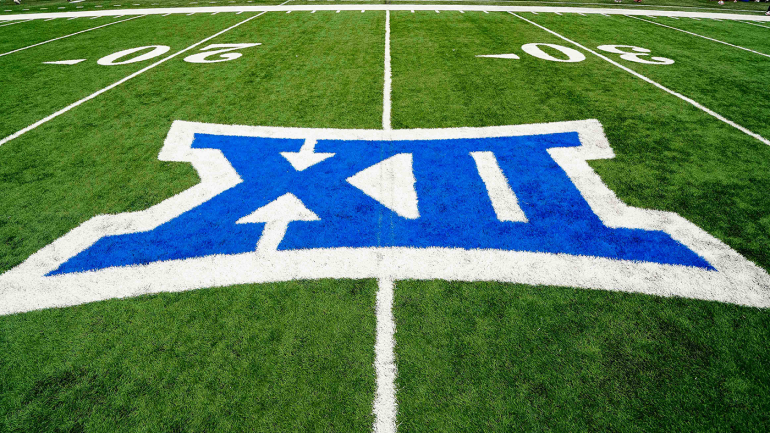
Faced with the potential for an unstable future given the changing landscape of college sports, the Big 12 has secured its financial stability through at least the 2030-31 season. The conference has agreed to terms and is in the process of finalizing a six-year, $2.3 billion extension of its media rights agreement with partners ESPN and Fox Sports, sources tell CBS Sports' Dennis Dodd.
Though the Big 12 will remain under the terms of its current deal paying the conference $220 million per season through 2024-25, that annual payout will increase to an average of $380 million beginning in 2025-26. CBS Sports reported on Oct. 19 that the Big 12 expected to finalize a deal within a two-week span.
Securing a stronger media rights contract was the top task assumed by Big 12 commissioner Brett Yormark, who took over the job from long-time league boss Bob Bowlsby on Aug. 1. By convincing ESPN and Fox to agree on opening an exclusive negotiating window early, Yormark successfully got a deal done with the networks ahead of the Pac-12, a Power Five conference peer also on tenuous footing given ongoing conference realignment.
While the Big 12 will lose Texas and Oklahoma to the SEC beginning in 2025, it has backfilled its roster with future league members BYU, Cincinnati, Houston and UCF. Big 12 teams will eventually rake in an average of $47 million per season in rights fees, including payouts from the College Football Playoff and NCAA Tournament. That figure could exceed $50 million once the CFP expands to 12 teams as expected.
While Big 12 teams will earn approximately $5 million more annually with the contract extension than they currently receive with the Longhorns and Sooners in the league, had those programs remained in the Big 12, the conference would have received a far larger contract. Still, this is a win for a league that once thought its media rights value might be halved with UT and OU leaving for the SEC.
The competitiveness of the Big 12 this season -- with teams other than Texas and Oklahoma stepping into prominent roles leading the league -- was at least partially responsible for a deal getting done so quickly.
The Pac-12, meanwhile, will see USC and UCLA depart for the Big Ten in 2024. It has not yet expanded its membership, and it's media rights value has plummeted below that of the Big 12 as a result. The Pac-12's exclusive negotiating window with ESPN and Fox has since lapsed with the conference appearing open to parcelling out at least some of its rights to a major streaming service.
Also crucial to the Big 12's extension is its shorter terms. With the contract now ending in 2031, the Big 12 will position itself to negotiate its next media rights deal ahead of the SEC and ACC, whose exclusive contracts with ESPN expire in 2034 and 2036, respectively.
According to the SportsBusiness Journal, which also reported the Big 12 extension on Sunday, ESPN will receive the first four college football game selections each season along with six of the top eight, eight of the top 12 and 12 of the top 20. ESPN will also be the home of the Big 12 championships in football and basketball, while Fox will air Big 12 college basketball games for the first time.
![[object Object] Logo](https://sportshub.cbsistatic.com/i/2020/04/22/e9ceb731-8b3f-4c60-98fe-090ab66a2997/screen-shot-2020-04-22-at-11-04-56-am.png)

















